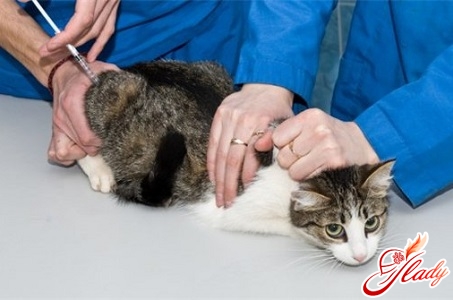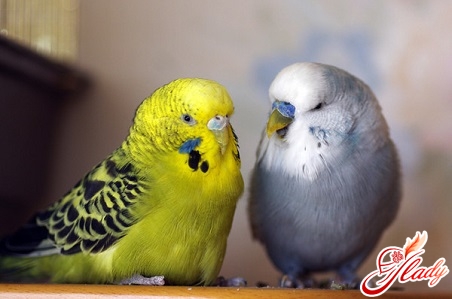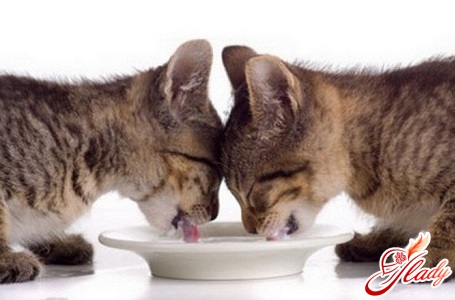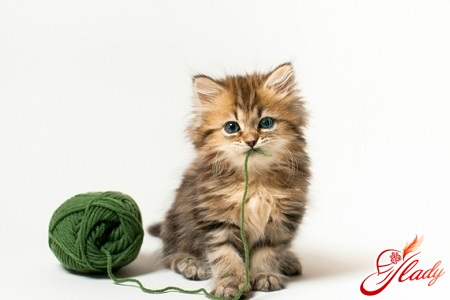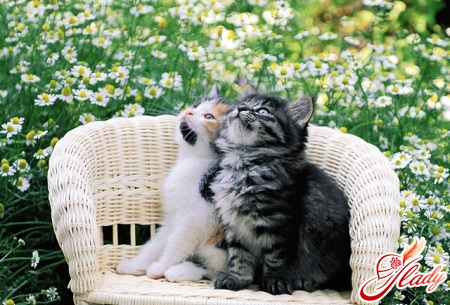 Cats and to this day remain the most popularpets around the world. And one of the main reasons for this popularity is the belief that cats do not need any special care. They, for example, unlike dogs, do not have to walk. Cats, like birds or the same hamsters do not need a personal home. And even the feeding of domestic cats does not cause any difficulties due to the huge assortment of ready-made fodders. This is partly true. However, care of cats is still necessary. Of course, the cat, as you know, walks by itself and has unique ability to adapt and survive. But if the animal lives next to a person, then this same person can not simply take and take off all responsibility for the one who has tamed. A domestic cat lives in hothouse conditions and is deprived of many opportunities unlike its wild relatives. Therefore, it is necessary to create certain conditions for the realization of natural instincts. In addition, as a result of breeding work and lack of natural selection in pedigreed cats, immunity is significantly reduced. Hence, the owners must monitor the health of their pets. And the very existence of a man in the house requires the owners to carry out certain hygienic procedures for cats. And what exactly should be the care of the cat, we will try to find out.
Cats and to this day remain the most popularpets around the world. And one of the main reasons for this popularity is the belief that cats do not need any special care. They, for example, unlike dogs, do not have to walk. Cats, like birds or the same hamsters do not need a personal home. And even the feeding of domestic cats does not cause any difficulties due to the huge assortment of ready-made fodders. This is partly true. However, care of cats is still necessary. Of course, the cat, as you know, walks by itself and has unique ability to adapt and survive. But if the animal lives next to a person, then this same person can not simply take and take off all responsibility for the one who has tamed. A domestic cat lives in hothouse conditions and is deprived of many opportunities unlike its wild relatives. Therefore, it is necessary to create certain conditions for the realization of natural instincts. In addition, as a result of breeding work and lack of natural selection in pedigreed cats, immunity is significantly reduced. Hence, the owners must monitor the health of their pets. And the very existence of a man in the house requires the owners to carry out certain hygienic procedures for cats. And what exactly should be the care of the cat, we will try to find out.
Conditions of detention
For a comfortable existence in a person's housecats need three things: a tray, a nail and a couch or a specially equipped house. The first thing you need to buy is a tray. It is necessary to accustom a cat to a personal toilet from a very young age. Usually, this does not cause difficulties if the tray is selected correctly and located in a cat-friendly place. The size of the tray must be sufficient to allow the animal to fit in it completely - a small cat tray can be ignored. To arrange a cat's toilet should be in a secluded place, so that the cat does not experience discomfort in such a delicate process. And, of course, she should always have access to her tray. It is also important that you use as a filler. It is best to purchase special fillings for the cat's toilet - they hold the smell well. Sand like cats, but it is considered unhygienic: and the smell does not hold, and clings to the paws. Some owners of cats teach their pets to cope with the need for a tray filled with scraps of newspaper, and some cats are content even with an empty tray. The nail clip is also needed for domestic cats. Any cat and at any age will necessarily sharpen claws, and we can not wean it from it. Therefore, if you do not want furniture and walls in your house not to be torn with cat claws, try to teach the animal to scratch. It can be made independently or purchased at the store of goods for animals. A bed or a special house for a cat is also needed. However, this is not a necessary subject, like a tray or a scratching pad. By the way, many domestic cats persistently ignore the beds and lodges purchased or made for them. But most often cats do not refuse the opportunity to retire, soak up the soft stove or hide in the house. 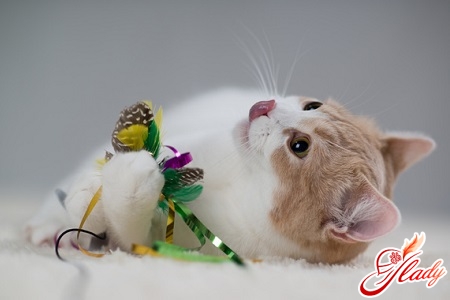
Feeding
Many owners of cats do not burden themselvescooking for their pets and limited to buying ready-made food. And this, in general, is entirely permissible. But the one who feeds cats from his table, exposes the animal's health to a certain risk and shortens his life. Remember! What a person prepares for himself is absolutely not suitable for feeding cats! Therefore, if you want to feed the cat with natural food, be prepared for the necessity of cooking special food for her. The cat diet should consist of meat (main part), cereals and vegetables. Cats are useful for raw and boiled meat and poultry, cereals from cereals, as well as raw or boiled vegetables. You can give cats and fruits, as well as dairy products. The most suitable meat for cats is beef, chicken, rabbit. You can not feed cats with pork, as well as raw by-products and fish. As for fish, it should not become the main source of proteins, and give it to cats only in boiled or steamed form. Virtually all cereals are well absorbed by the cat's body, so cook for it porridge of oatmeal, yachek or buckwheat, wheat or pearl barley. But legumes (peas, beans, lentils) are contraindicated to cats. Vegetables are also needed for cats, and it is possible to include practically everything except potatoes in its diet. Most often, vegetables are added to the meat broth based on the meat broth. But if your pet likes to crunch a fresh carrot or cucumber, do not deprive her of such pleasure. All non-fatty sour-milk products, except sour cream and cheese, are also useful for cats. As for fresh milk, it must necessarily enter the diet of a small kitten, but in adult animals it can cause indigestion. Ready dry and moist feed can also be given to cats. Only buy only high-quality products, feed the best of the class and give them in accordance with the instructions. Do not feed adult animals with fodder intended for kittens, and feeds of super-advantage-class, which can be given to cats only during preparation for exhibitions. A combination of ready food and natural food is acceptable. Do not forget that very small kittens, pregnant cats and neutered cats require special food. Therefore, make a menu for them after consulting a veterinarian. For cats of any age and regardless of the diet, permanent access to clean fresh water should be ensured. 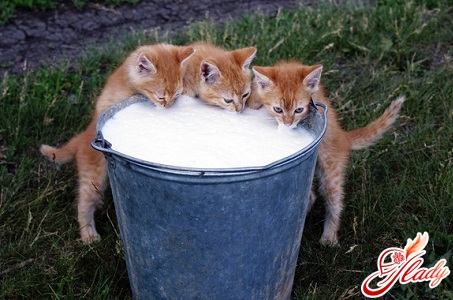
Hygienic procedures
Care for cats involves a number of hygienicprocedures. The care needs animal hair or skin from the hairless cats. In addition, cats need to clean their ears and teeth, as well as periodically claw claws. More careful care for kittens is caused by their inability to monitor personal hygiene. Therefore, kittens are often cleaned eyes and a nose, wipe the face and clean the hair under the tail. In the future, the animal will learn to cope with all this independently and your help will not be needed. But the proper care for both small kittens and adult cats implies a periodic combing of the wool. Firstly, cats molt, and secondly, this procedure has a beneficial effect on the condition of the coat and the appearance of the animal. In this case, you can also notice some signs of internal diseases (dandruff, hair loss), infection of the animal with parasites or fungal infections. Hairless cats require care of skin. They should be regularly bathed in warm water with the addition of a soft baby shampoo or tar soap. True, bathing should be done no more than once a week. Cats need to periodically clean their ears, using a cotton swab moistened with a special ears cleaner, and wipe the grooves and grooves of the auricle with cotton buds. Need a domestic cat and brushing your teeth. But this is only if there is no solid food. To clean the cat's teeth, the children's toothbrush and tooth powder without fragrances are quite suitable. However, recently you can buy a special toothpaste for cats. The frequency of the procedure depends on the condition of the cat's teeth, but a weekly cleaning will be enough. Clipping claws is necessary for those cats who do not have the opportunity to walk outdoors and grind their claws on hard surfaces. True, claw claws only when they become too long and cause discomfort to the animal itself. In shortening, claws longer than normal are needed, and normally the cat's claws must have the shape of an arc and do not bend to the bottom very much. Cuts claws with manicure scissors or tweezers, shortening them no more than two or three millimeters.
Health
Care for a domestic cat is not only a creationcomfortable conditions for it, proper feeding and hygiene procedures. It is very important to monitor the health of the cat. Young animals are susceptible to all kinds of infections, and with age, the development of diseases of internal organs is not ruled out. Therefore, firstly, any domestic cat must be vaccinated. Vaccinations are carried out according to a certain scheme recommended by a veterinarian. In addition to routine preventive vaccinations, the cat needs to be vaccinated before moving to the dacha and if you take her on a trip. Regularly the cat needs to be flayed. Ideally, this procedure should be conducted every season, that is, four times a year. And if your cat walks on the street, then, probably, more often. And, of course, it is necessary to regularly conduct preventive examinations in the veterinary clinic. And it must be done even if the animal looks perfectly healthy. So do not harbor the hope that in the care of cats do not need, so absolutely no trouble to their owners do not deliver. If you are not ready to spend time and money on a pet, then it is better not to start it at all. And if you decide to settle a cat in your house, always remember that you are responsible for those who have tamed. We advise you to read:




